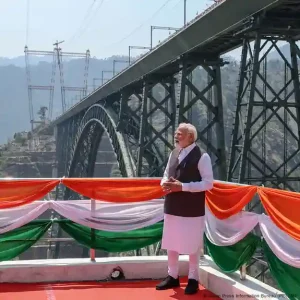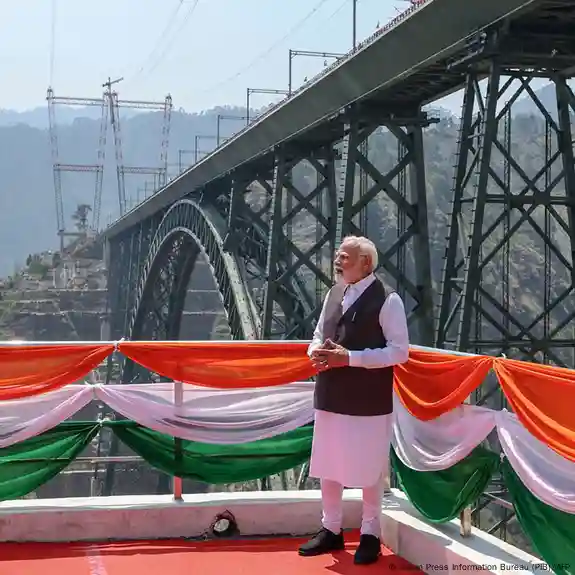Indian Prime Minister Narendra Modi inaugurated a railway line in Kashmir meant to boost connectivity. This is his first visit to the disputed region after the recent conflict between India and Pakistan

Indian Prime Minister Narendra Modi on Friday opened a strategic railway project linking the Kashmir Valley to the Indian mainland by train for the first time.
The 272-kilometer (169-mile) line begins in the garrison city of Udhampur in the Jammu region and runs through Srinagar, the main city of Indian-controlled Kashmir.
This marks Modi’s first visit to the contested region since last month’s military clashes between India and Pakistan.
Modi also inaugurated the Chenab Rail Bridge, touted as the world’s highest railway arch bridge, along with several other infrastructure projects.
“PM @narendramodi Ji inaugurated the world’s highest railway arch bridge – Chenab bridge & India’s first cable stayed railway bridge-Anji bridge,” India’s Minister for Railways Ashwini Vaishnaw posted on X.
Better connectivity with Kashmir
The railway project is part of Modi’s broader push for infrastructure development worth billions of dollars in the region, aimed at enhancing Kashmir’s connectivity with the rest of India.
“In addition to being an extraordinary feat of architecture, the Chenab Rail Bridge will improve connectivity,” Modi said in an Instagram post ahead of his visit.
He walked across the bridge holding a large Indian flag, symbolizing its official opening.
The Udhampur-Srinagar-Baramulla railway is intended to ease transportation to and from the Himalayan valley, which was previously accessible mainly by road and air.
Modi said the line would ensure “all-weather connectivity” and “boost spiritual tourism and create livelihood opportunities.”
The railway is expected to cut travel time between Katra in the Hindu-majority Jammu region and Srinagar in Muslim-majority Kashmir to just three hours.
Border tensions between India and Pakistan
Tensions between India and Pakistan have remained high following the April 22 attack near the mountain town of Pahalgam in Indian-administered Kashmir, which left 26 people—mostly tourists—dead.
India blamed Pakistan for supporting the militants and launched “Operation Sindoor,” a series of airstrikes targeting locations in Pakistan and Pakistan-administered Kashmir. Pakistan denied the allegations and responded with drone strikes on Indian targets.
The nuclear-armed neighbors signed a ceasefire agreement on May 10. Since then, India has dispatched delegations to several countries to rally support for its “zero tolerance” policy toward terrorism, which it claims originates in Pakistan.
Edited by: Louis Oelofse
DW News


